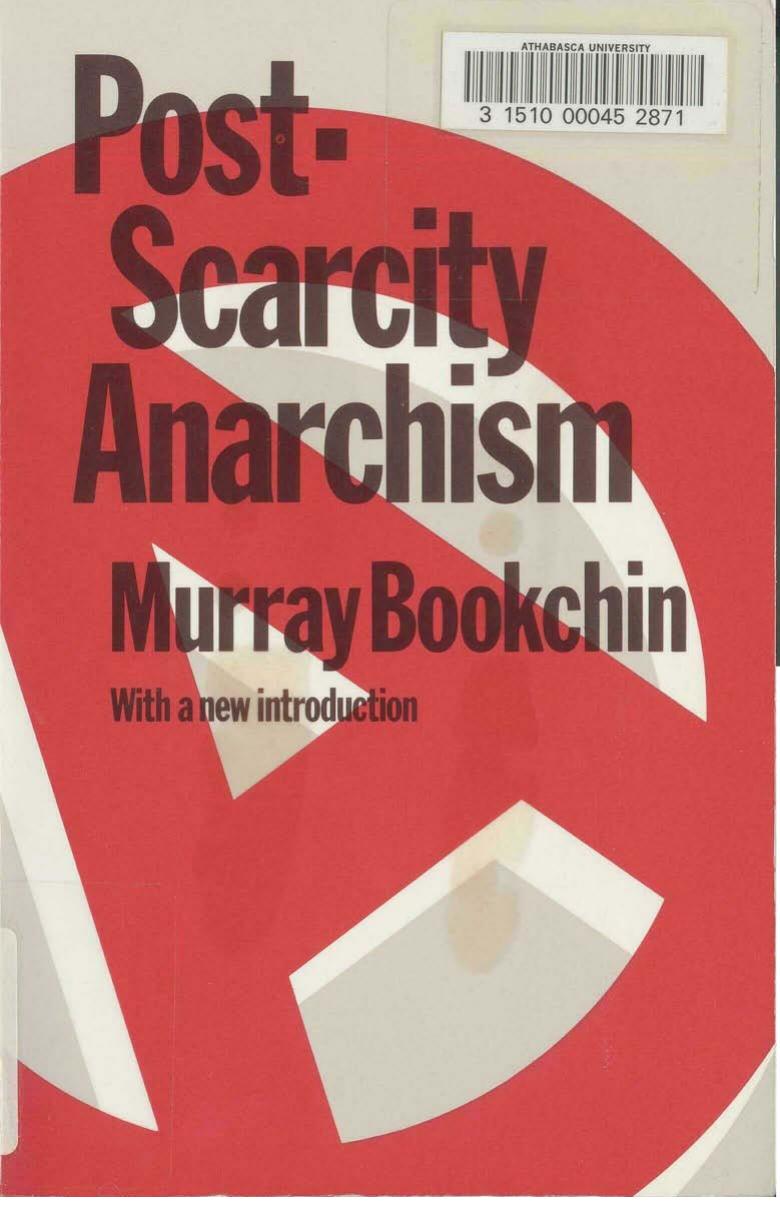Post-Scarcity Anarchism by Murray Bookchin

Author:Murray Bookchin [Bookchin, Murray]
Language: eng
Format: epub, pdf
Published: 2015-11-22T02:00:00+00:00
Towards a
Liberatory
Technology
D
Not since the days of the Industrial Revolution have popular attitudes toward technology fluctuated as sharply as in the past few decades. During most of the twenties, and even well into the thirties, public opinion generally welcomed technological innovation and identified man's welfare with the industrial advances of the time. This was a period when Soviet apologists could justify Stalin's most brutal methods and worst crimes merely by describing him as the "industrializer" of modern Russia. It was also a period when the most effective critique of capitalist society could rest on the brute facts of economic and technological stagnation in the United States and Western Europe. To many people there seemed to be a direct, oneto-one relationship between technological advances and social progress; a fetishism of the word "industrialization" excused the most abusive of economic plans and programs.
Today, we would regard these attitudes as naive. Except perhaps for the technicians and scientists who design the "hardware," the feeling of most people toward technological innovation could be described as schizoid, divided into a gnawing fear of nuclear extinction on the one hand, and a yearning for material abundance, leisure and security on the other. Technology, too, seems to be at odds with itself. The bomb is pitted against the power reactor, the intercontinental missile against the communications satellite. The same technological discipline tends to appear both as a foe and a friend of humanity, and even traditionally human-oriented sciences, such as medicine, occupy an ambivalent position—as witness the promise of advances in chemotherapy and the threat created by research in biological warfare.
It is not surprising to find that the tension between 107
108 / Post-Scarcity Anarchism Towards a Liberatory Technology I 109 promise and threat is increasingly being resolved in favor of threat by a blanket rejection of technology. To an evergrowing extent, technology is viewed as a demon, imbued with a sinister life of its own, that is likely to mechanize man if it fails to exterminate him. The deep pessimism this view produces is often as simplistic as the optimism that prevailed in earlier decades. There is a very real danger that we will lose our perspective toward technology, that we will neglect its liberatory tendencies, and, worse, submit fatalistically to its use for destructive ends. If we are not to be paralyzed by this new form of social fatalism, a balance must be struck.
The purpose of this article is to explore three questions. What is the liberatory potential of modern technology, both materially and spiritually? What tendencies, if any, are reshaping the machine for use in an organic, humanoriented society? And finally, how can the new technology and resources be used in an ecological manner—that is, to promote the balance of nature, the full development of natural regions, and the creation of organic, humanistic communities?
The emphasis in the above remarks should be placed on the word "potential." I make no claim that technology is necessarily liberatory or consistently beneficial to man's development. But I surely do not
Download
This site does not store any files on its server. We only index and link to content provided by other sites. Please contact the content providers to delete copyright contents if any and email us, we'll remove relevant links or contents immediately.
| Anthropology | Archaeology |
| Philosophy | Politics & Government |
| Social Sciences | Sociology |
| Women's Studies |
The Secret History by Donna Tartt(19007)
The Social Justice Warrior Handbook by Lisa De Pasquale(12178)
Thirteen Reasons Why by Jay Asher(8875)
This Is How You Lose Her by Junot Diaz(6862)
Weapons of Math Destruction by Cathy O'Neil(6252)
Zero to One by Peter Thiel(5772)
Beartown by Fredrik Backman(5719)
The Myth of the Strong Leader by Archie Brown(5484)
The Fire Next Time by James Baldwin(5416)
How Democracies Die by Steven Levitsky & Daniel Ziblatt(5201)
Promise Me, Dad by Joe Biden(5132)
Stone's Rules by Roger Stone(5068)
A Higher Loyalty: Truth, Lies, and Leadership by James Comey(4942)
100 Deadly Skills by Clint Emerson(4901)
Rise and Kill First by Ronen Bergman(4765)
Secrecy World by Jake Bernstein(4732)
The David Icke Guide to the Global Conspiracy (and how to end it) by David Icke(4687)
The Farm by Tom Rob Smith(4490)
The Doomsday Machine by Daniel Ellsberg(4476)
